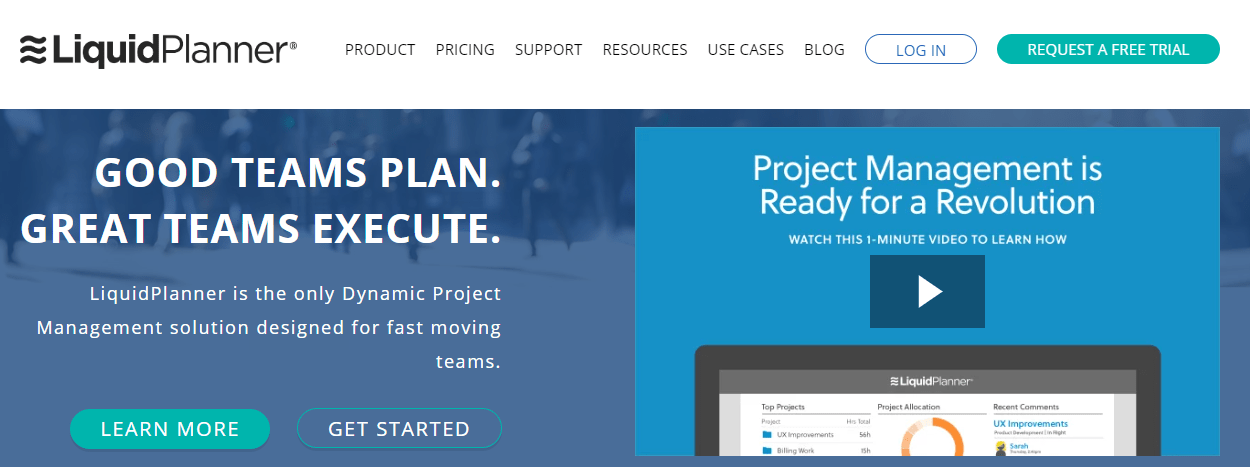All companies, no matter how big or small, need some sort of system in place which would make their planning easier. Even if you’re running a one-man business, you’ll need a way to track the progress of all short-term and long-term tasks.
Of course, nowadays, piles of notebooks, agendas, and gigantic paper spreadsheets are out of the question. Not only because they are outdated, but because they aren’t as efficient as various software solutions.
The majority of these software-on-demand options aren’t free, but many of them have free trial periods which give you an opportunity to see if a specific software solution works for you. Also, they will often have different monthly plans priced according to the number of features they offer.
In this article, we will take go over some of the best project management SaaS solutions on the market. So in case you need help choosing one for your organization, take a look at the short overviews of our top five picks below.
LiquidPlanner

Among its most prominent features is Smart Schedule. Something that is quite helpful when it comes to prioritizing between projects. Also, once a project is underway, it can track the amount of time a team has spent on it.
Additional tracking options allow you to monitor the amount of time each team has invested and instantly highlight the employees who have finalized their projects and with that became available for new ones. Also, each bit of the workload can be logged, which helps the app calculate how each task influences the progress of the project.
This software solution is truly thorough and helpful, but it also requires significant training time in order for people to use it to its full capacity. Besides, it is not among the cheaper options. So, if your company isn’t large enough to need this kind of software or stable enough to be able to finance the included expenses, then you should keep looking.
If, however, this comprehensive software is just what you need, don’t worry – it will deliver everything it promises on all fields.
Trello

Firstly, it is built based on the simple kanban principle, which is easy to understand and follow. On top of this, its interface is straightforward, so there will be no need for extensive training before you introduce the software into your daily office routine.
Still, although it’s clear and simple, it offers a lot of useful options. For example, you can create as many boards as necessary to organize all projects.
The option of adding to-do lists within task cards has made delegating tasks additionally smoother. Files can also be attached within cards, and there’s a section for comments as well. Additionally, it allows integration with Google Hangouts and Slack, and it’s available on all devices and operating systems.
Despite how handy this software is, it is not designed for traditional rigid project management, and it doesn’t enable any detailed reporting or tracking. So you could say it is more appropriate for flexible workflow management and is definitely a great option for smaller companies.
Wirke
Wirke is a software similar to Trello when it comes to its simple navigation. However, there are some options it offers that Trello doesn’t have.
Firstly, there’s reporting. It enables both the employee and the superior to see how much time has been invested in a project in question. Although the tracking abilities of Wirke are limited, they will do just fine if you only need the basic data.
Also, this software offers options such as the creation of Gantt charts and a clear overview of several different dashboards. This makes it great for small or medium project management. Especially since it won’t take lengthy training for your workers to be able to use it adequately. It also allows integration with several different software services, which adds to its functionality.
When it comes to pricing, they are quite generous. There is a free plan, and the number of projects you can add through it is not limited. However, the number of employees is restricted, so this makes the free plan appropriate, but only for small businesses.
Basecamp
Basecamp is a well-known project management option that has been around for almost a decade. During this time, it has gathered a solid user base, who loves it for its reliability and comprehensiveness.
It has several distinctive functions, which for many companies, cover most of their project management necessities. For example, there is a chat feature, which allows both individual and group chats. You can also turn off notifications when you finish your shift, as well as add a reaction to someone else’s messages. Sounds familiar? Yup, it’s much like Slack.
Communication with clients is also enabled through email integration which allows sharing details about projects with people who aren’t in the system. This is what facilitates quick feedback from the clients, as well as keeping them posted on the progress of the project.
Other helpful options include file storage as well as creating schedules and adding calendars. All these features make Basecamp great for big projects if you want to keep all your data in one convenient place.
ZohoProjects
ZohoProjects is another software solution rich in options that is at the same time very affordable.
First of all, using it you can choose the system style – kanban or traditional. Then, among its most valued features is customized reporting which is above the basic level and allows management of both individual tasks and the overall workflow. Additionally, the time tracking option is slightly advanced, and although it cannot entirely substitute the apps made specifically for that purpose, it’s still solid.
ZohoProjects also allows you to track and fix mistakes through it. On top of this, it has an integrated chat feature, which makes communication much easier and saves time on switching between different apps.
In case you still need other services from Zoho suite, Google, or Microsoft, you’ll be able to easily integrate them with this software.
When it comes to pricing plans, this software has a free version, but it allows only 10MB of data at a time, and only one project. If this isn’t enough for your company’s needs, you will have the opportunity to try out the paid plans for free, during a 10-day trial period.
Conclusion
These are our shortlisted candidates for the best SaaS solutions for project management.
Depending on the size and the needs of your company, and with the help of our list, you can now make the right choice for you. And remember, in case you aren’t sure that you want one specific service, there is usually a trial period with most of them which you should use wisely to test the software thoroughly.
